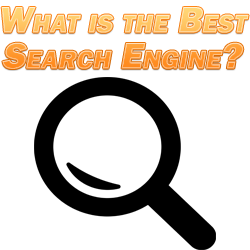SEO, or search engine optimization, should be a major concern for any webmaster. Although no traffic source is permanent or completely stable (hence the importance of traffic diversity), SEO is one of the more reliable traffic sources.
Not only is it reliable, but search engine traffic can be viewed as being more valuable than other sources due to the fact that there is a certain amount of ethos associated with web pages which have reached the top of the search engines in which people give that page extra credibility just by virtue of its ability to claim that top spot, making it more likely that they’ll trust what we have to say, sign up for our offers, etc.
Given that we’re performing optimization on and off our sites to impress the search engines, it’s worth knowing what is the best search engine of today.
What is the Best Search Engine
For our purposes, the best search engine is the most popular one which allows us to put our site and content in front of the greatest audience. According to a study, not surprisingly Google is overwhelmingly the favorite and most popular search engine, claiming as much as 72% of the full market share as recent as last year.
Bing doubled their popularity last year from the year before thanks largely in part to their aggressive television marketing campaign, yet Google still hasn’t given up much ground in that time.
Although it’s obvious that Google is the favorite from that percentage, let’s not forget that that figure can sway on a case by case basic. Example: ConvertingCopy.com.
This image was taken from my latest Google Analytics report (see how to add Google Analytics to your website if you haven’t done so already). I refined the traffic results to just focus on the traffic which came directly from the search engines themselves.
As you can see, over 99% or practically all of my organic search engine traffic in the last month came from Google whereas I experienced trace visitors from Bing, Yahoo, etc. According to that statistic I linked to earlier, I should be receiving somewhere around 72% of my traffic from Google, give or take a dozen percent. But 99% just from Google?
This can be accounted for by 2 reasons.
One, my target demographic and audience uses Google. It’s true that different types of people use different search engines. Google applies to the masses obviously, but it is also the choice search engine for webmasters, people interested in the business of the internet, more tech oriented people, and generally speaking exactly the kinds of people whom would be visiting my site, so that plays a substantial role in that sizable disparity.
Two, I’m not ranking as well in other search engines. I rank well for many of my keywords in Google (thankfully) whereas with the other search engines I don’t crack the top 20 for most of my keywords.
I’ve heard different and oftentimes conflicting things about what it takes to rank well in other search engines, but typically I meet or address every one of those factors on my site.
Generally speaking, the same basic factors and practices SHOULD apply to all search engines as all search engines want the best content to rise to the top, and the basis for measuring the best content should typically stay roughly the same. What DOES differ is how each individual engine chooses to split up the importance of each factor in their algorithms.
Doing a few basic Bing searches for example, very few of the keywords I searched for appeared in the title tag of the top 10 results.
No one knows what exactly goes into the algorithms search engines use to rank sites. This is how search engines remain secretive and consequently successful; if they made that information publicly available, everyone would use that information to take advantage of or con the system and spammy webmasters promoting crap would likely dominate much of the search results.
In doing some Yahoo searches, I found that articles which I had written on article directories like Ezine Articles based on posts from my website were outranking my website. I’m talking several keywords returned my articles well before my site itself, oftentimes on the second or even first page of the SERPs; and this is all without any optimization/link building to those articles.
Now this makes sense, because if you recall earlier this year during Google’s content farm update, Google severely diminished the influence of content farms in terms of link juice and ranking within Google, so while this is something which would NEVER happen in Google after this update, article directories still apparently flourish in the other search engines.
What is the Best Search Engine
Getting back to the original question of what is the best search engine, one final unintentional observation which I made in using other search engines was that the search results/web pages I received for my keywords were not nearly as relevant or helpful to my searches as they were using Google, and it’s hard to argue with the bottom line.
I know that I’ll rank better in time on other search engines, admittedly this is still a very young site and domain age/authority is a large ranking factor in most search engines. I also believe that the other engines need to look at their own product and could benefit in taking a page or two from Google before continuing to spend millions in television advertising campaigns.
Now if you’ll excuse me I have a soapbox to climb down from.

